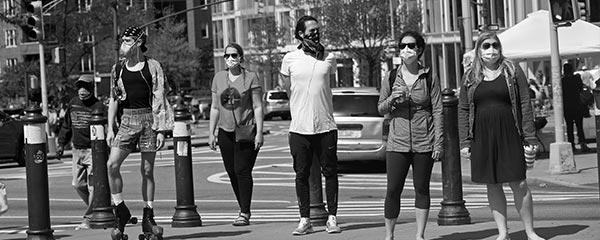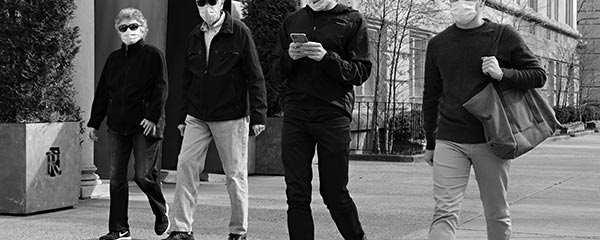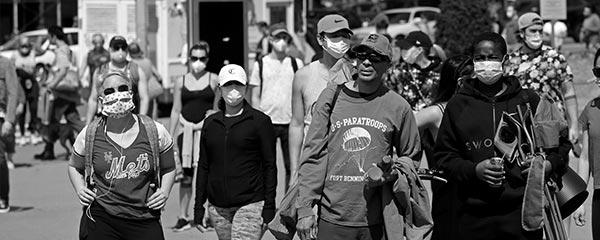Story Highlights
- 61% say preventing COVID-19 spread more important than protecting privacy
- Seniors, city residents most likely to accept reduced patient confidentiality
- 57% of Republicans prioritize medical privacy
WASHINGTON, D.C. -- A majority of U.S. adults believe that preventing the spread of the coronavirus is more important than protecting people's medical privacy. Amid the growing use of digital medical data to track COVID-19 infections, 61% of Americans prioritize these preventative efforts, even if that means people have to reveal sensitive medical information.
As more cities and states loosen stay-at-home restrictions and businesses reopen during the COVID-19 crisis, some experts and officials are pushing for expanded contact tracing. Contact tracing -- identifying and informing people who may have come into contact with an infected person -- involves releasing personal information to local authorities and, in some countries, to the broader public when new cases are confirmed, using medical and cellphone location data.
Majorities of all age groups; of city, suburban and rural residents; and of working and nonworking people prioritize taking steps to contain the spread of COVID-19 over protecting medical privacy.
| Protecting people's medical privacy | Preventing the spread of the coronavirus | |||||||||||||||||||||||||||||||||||||||||||||||||||||||||||||||||||||||||||||||||||||||||||||||||||
|---|---|---|---|---|---|---|---|---|---|---|---|---|---|---|---|---|---|---|---|---|---|---|---|---|---|---|---|---|---|---|---|---|---|---|---|---|---|---|---|---|---|---|---|---|---|---|---|---|---|---|---|---|---|---|---|---|---|---|---|---|---|---|---|---|---|---|---|---|---|---|---|---|---|---|---|---|---|---|---|---|---|---|---|---|---|---|---|---|---|---|---|---|---|---|---|---|---|---|---|---|
| % | % | |||||||||||||||||||||||||||||||||||||||||||||||||||||||||||||||||||||||||||||||||||||||||||||||||||
| All Americans | 39 | 61 | ||||||||||||||||||||||||||||||||||||||||||||||||||||||||||||||||||||||||||||||||||||||||||||||||||
| Age | ||||||||||||||||||||||||||||||||||||||||||||||||||||||||||||||||||||||||||||||||||||||||||||||||||||
| 18-44 | 42 | 58 | ||||||||||||||||||||||||||||||||||||||||||||||||||||||||||||||||||||||||||||||||||||||||||||||||||
| 45-64 | 44 | 56 | ||||||||||||||||||||||||||||||||||||||||||||||||||||||||||||||||||||||||||||||||||||||||||||||||||
| 65 and over | 28 | 72 | ||||||||||||||||||||||||||||||||||||||||||||||||||||||||||||||||||||||||||||||||||||||||||||||||||
| Place of residence | ||||||||||||||||||||||||||||||||||||||||||||||||||||||||||||||||||||||||||||||||||||||||||||||||||||
| City | 31 | 69 | ||||||||||||||||||||||||||||||||||||||||||||||||||||||||||||||||||||||||||||||||||||||||||||||||||
| Suburb | 38 | 62 | ||||||||||||||||||||||||||||||||||||||||||||||||||||||||||||||||||||||||||||||||||||||||||||||||||
| Small town/Rural area | 45 | 55 | ||||||||||||||||||||||||||||||||||||||||||||||||||||||||||||||||||||||||||||||||||||||||||||||||||
| Employed | ||||||||||||||||||||||||||||||||||||||||||||||||||||||||||||||||||||||||||||||||||||||||||||||||||||
| Yes | 43 | 57 | ||||||||||||||||||||||||||||||||||||||||||||||||||||||||||||||||||||||||||||||||||||||||||||||||||
| No | 35 | 65 | ||||||||||||||||||||||||||||||||||||||||||||||||||||||||||||||||||||||||||||||||||||||||||||||||||
| ║┌┴¤═° Panel, April 27-May 10, 2020 | ||||||||||||||||||||||||||||||||||||||||||||||||||||||||||||||||||||||||||||||||||||||||||||||||||||
These results are from an April 27-May 10 web survey, collected using a probability-based sample of 8,564 U.S. adults from the ║┌┴¤═° Panel. More than seven in 10 older adults -- those aged 65 and older -- believe preventing the spread of the coronavirus is more important than protecting medical privacy. Older adults, who are at higher risk for developing more serious complications from COVID-19 illness, are more likely to prioritize efforts to prevent COVID's spread (72%) than adults 18-44 (58%) and 45-64 (56%).
Residents of cities are highly likely to say that preventing the spread of the coronavirus is more important than protecting people's medical privacy (69%). However, a majority of residents from suburbs (62%) and small towns/rural areas (55%) also think doing so is more important.
A majority of employed adults (57%) say that preventing the spread of the coronavirus is more important, even if that means people have to reveal sensitive medical information. However, employed adults are more likely than those not working to prioritize protecting people's medical privacy. This is notable because some employers are ramping up contact tracing and strictly enforcing social distancing in the workplace, sometimes using apps to track how close employees get to each other.
Republicans Most Likely to Prioritize Medical Privacy
Republicans are the most likely of all party groups to think that protecting people's medical privacy is paramount -- 57% say protecting people's medical privacy is the more important goal, versus 42% of independents and 23% of Democrats. More than three-quarters of Democrats (77%) think that preventing the spread of the coronavirus is more important.

These findings reflect an ongoing partisan divide in most attitudes about the coronavirus situation in the U.S. However, Republicans are far from unified on the privacy question because 43% believe it is more important to prevent the spread of the virus, even if that means jeopardizing medical privacy.
Bottom Line
As more businesses reopen and Americans return to the workplace, shop in retail stores and visit other places closed because of the COVID-19 crisis, there will likely be increasing calls for health surveillance, including rigorous contact tracing, to prevent additional outbreaks. Such efforts will require new tools and practices that could weaken safeguards for digital medical data and privacy laws. The options range from mobile contact tracing apps and so-called "immunity passports" that certify someone has recovered from COVID-19 to digital tools to enforce quarantines and public disclosure of personally identifiable information about those who have tested positive.
Artificial intelligence (AI) plays a central role in many contact tracing and predictive applications. According to a 2019 study by Northeastern University and ║┌┴¤═°, Democrats and Republicans had similarly high levels of concern about their personal privacy related to AI. Seventy-two percent of Republicans and 67% of Democrats reported worrying very often or often that their personal information is at risk when using products or services that employ AI.
The COVID-19 crisis has caused public health concerns to outweigh these privacy worries for a majority of Americans, particularly Democrats. As public officials and employers weigh the costs and benefits of exposing sensitive information and restricting privacy to curb new cases, a majority of Americans are willing to accept these negative consequences for patient confidentiality. However, as with many policy choices related to the COVID-19 recovery, there is little consensus by party. While nearly eight in 10 Democrats prioritize these efforts to stop the virus' spread, a majority of Republicans think that protecting people's medical privacy is more important.
Learn more about how the works.




